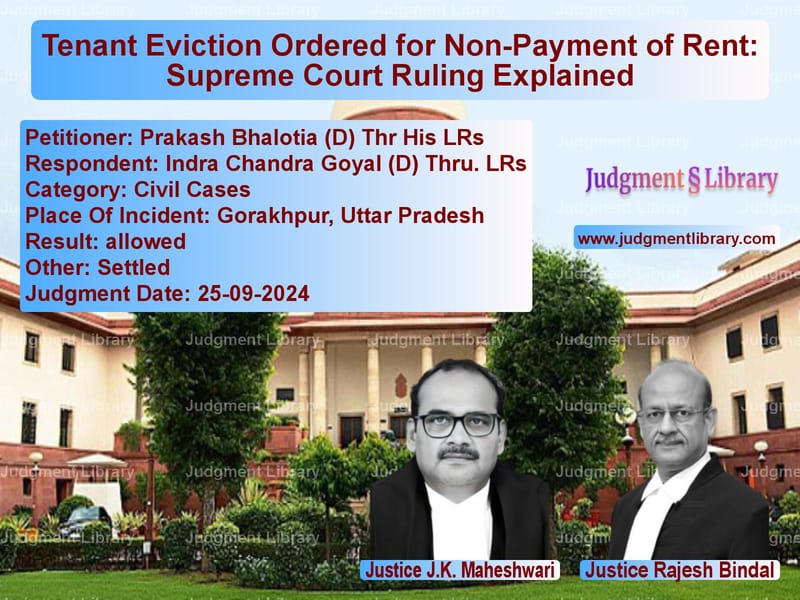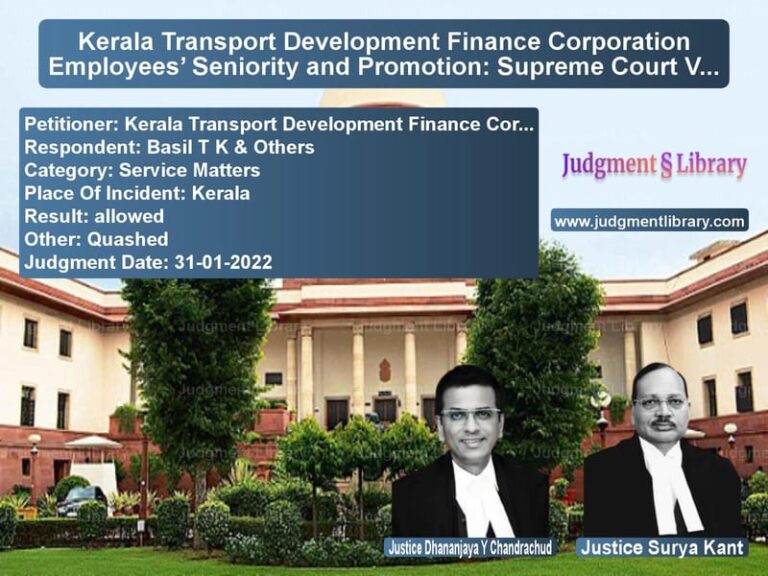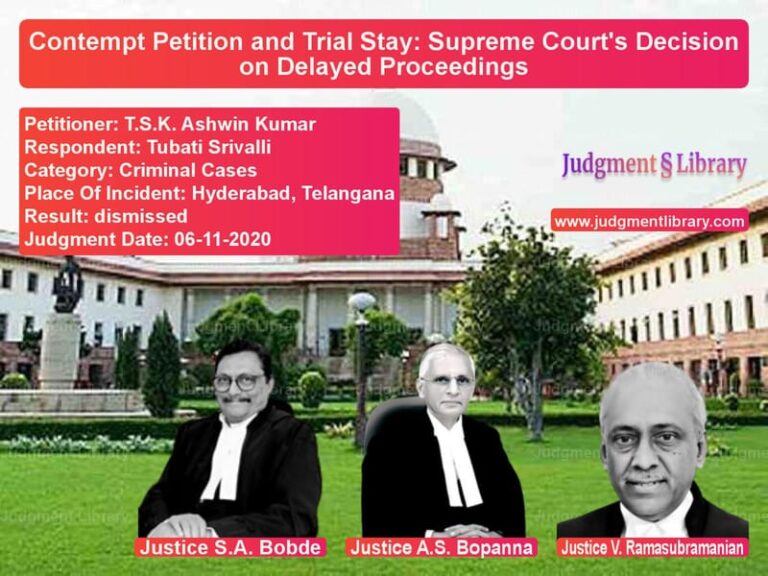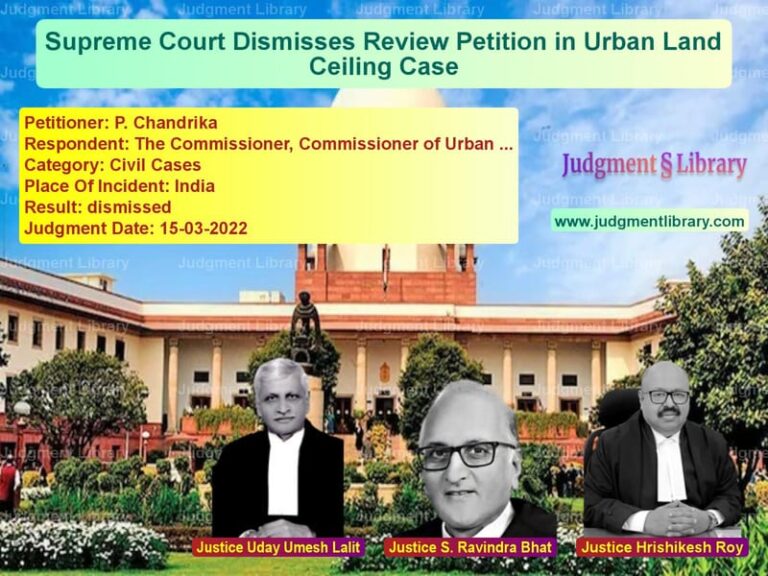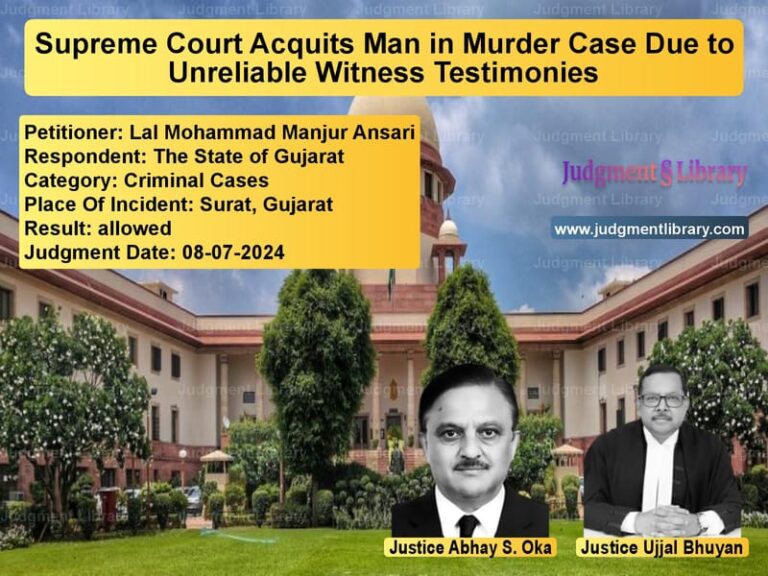Tenant Eviction Ordered for Non-Payment of Rent: Supreme Court Ruling Explained
The case of Prakash Bhalotia (D) Thr His LRs vs. Indra Chandra Goyal (D) Thru. LRs is a significant ruling by the Supreme Court concerning tenant eviction due to non-payment of rent and the application of the Uttar Pradesh Urban Buildings (Regulation of Letting, Rent, and Eviction) Act, 1972 (UP Rent Act). The Court overturned the decisions of the trial and high courts, ruling in favor of the landlord and ordering the eviction of the tenant.
The judgment clarifies the conditions under which a landlord can evict a tenant for rent default and the procedural requirements for tenants to seek protection under rent control laws.
Background of the Case
The appellant, Prakash Bhalotia, was the owner of Shop No. 4 in Gorakhpur. The respondent, Indra Chandra Goyal, had been a tenant of the shop under a tenancy agreement that commenced on July 1, 1985, for five years, ending on June 30, 1990.
The key allegations made by the landlord were:
- The tenant failed to pay rent after the tenancy period expired.
- The respondent continued occupying the shop without a valid agreement, making him an unauthorized occupant.
- A notice was served on the tenant for non-payment of rent, but no response was received.
Legal Arguments
Arguments by the Appellant (Landlord – Prakash Bhalotia)
- The tenancy agreement clearly stated that the lease period was for five years and had expired.
- The tenant was required to pay an increased rent if he wished to continue occupancy, which he failed to do.
- The tenant defaulted on rent payments and did not deposit the due amounts in court.
- Under the UP Rent Act, the tenant was required to pay rent regularly, but he did not comply.
- The findings of the lower courts were based on vague interpretations of rent deposit records.
Arguments by the Respondent (Tenant – Indra Chandra Goyal)
- He had been a tenant since 1977, before the formal agreement, and thus had protection under the UP Rent Act.
- He regularly deposited rent in court under Section 30 of the UP Rent Act.
- The trial court had accepted that the tenancy was continuous, and there was no willful default.
- The revision by the landlord should not be entertained as reappraisal of evidence is not permitted in appellate jurisdiction.
Supreme Court’s Observations
The Supreme Court scrutinized the case based on Sections 20 and 30 of the UP Rent Act, which govern tenant eviction due to non-payment of rent.
1. Was the Tenant in Continuous Default?
The Court found that the tenant had failed to pay rent for extended periods, violating Section 20(2)(a) of the UP Rent Act, which mandates eviction if rent is due for more than four months and not paid within one month of notice.
2. Did the Tenant Regularly Deposit Rent?
The tenant claimed he deposited rent in court. However, the Supreme Court observed that:
- Rent deposits were made sporadically, sometimes months after due dates.
- Several rent payments were made in bulk after legal notices were issued, rather than on a monthly basis.
- There was no evidence that the deposits included statutory interest on delayed payments, as required under Section 20(4) of the UP Rent Act.
3. Was the Lower Court’s Decision Justified?
The Supreme Court criticized the lower courts for failing to properly assess the default in rent payment. It ruled:
“The findings recorded by the Trial Court and confirmed by the High Court are completely perverse and without appreciating the real intent of the provisions of Sections 20 and 30 of the UP Rent Act.”
Final Verdict
The Supreme Court overturned the trial and high court rulings, stating:
- The tenant had defaulted on rent payments, making him ineligible for protection under the UP Rent Act.
- The eviction suit was valid, and the landlord had a legal right to seek possession of the shop.
- The tenant was ordered to vacate the premises by March 31, 2025, provided he continued paying rent until then.
- The tenant must file an undertaking with the High Court affirming compliance with the eviction order.
This ruling reinforces the necessity of strict compliance with rent laws and the obligations of tenants under the UP Rent Act.
Petitioner Name: Prakash Bhalotia (D) Thr His LRs.Respondent Name: Indra Chandra Goyal (D) Thru. LRs.Judgment By: Justice J.K. Maheshwari, Justice Rajesh Bindal.Place Of Incident: Gorakhpur, Uttar Pradesh.Judgment Date: 25-09-2024.
Don’t miss out on the full details! Download the complete judgment in PDF format below and gain valuable insights instantly!
Download Judgment: prakash-bhalotia-(d)-vs-indra-chandra-goyal-supreme-court-of-india-judgment-dated-25-09-2024.pdf
Directly Download Judgment: Directly download this Judgment
See all petitions in Landlord-Tenant Disputes
See all petitions in Property Disputes
See all petitions in Contract Disputes
See all petitions in Judgment by J.K. Maheshwari
See all petitions in Judgment by Rajesh Bindal
See all petitions in allowed
See all petitions in settled
See all petitions in supreme court of India judgments September 2024
See all petitions in 2024 judgments
See all posts in Civil Cases Category
See all allowed petitions in Civil Cases Category
See all Dismissed petitions in Civil Cases Category
See all partially allowed petitions in Civil Cases Category

